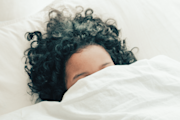What’s sleep hygiene, and why are sleep habits and a consistent sleep schedule so important?
It makes sense that good sleep hygiene can help us fall asleep and get better quality rest. But, does poor sleep hygiene negatively impact mental health?
Sleeping well and following a consistent sleep routine helps us to better regulate our emotions and mood and handle stress.
Regular good sleep can also improve our mental health and decrease our risk of developing mental health disorders.
A 2021 study found that lack of sleep in middle age may increase our risk of developing dementia. And a 2013 study found each extra hour of sleep reduces suicide risk in people with insomnia.
According to the Centers for Disease Control (CDC), one in three adults in America don’t get enough sleep. What’s more, research from the National Institutes of Health (NIH) estimates between 50 million and 70 million people struggle with sleep disorders.
If you find yourself struggling with insomnia or waking up every night at 3 a.m. or 4 a.m. unable to fall back to sleep, our sleep hygiene checklist (below) might be exactly what you need to experience the deep sleep of your dreams.
Read on for the meaning of good sleep hygiene, the benefits of a sleep routine, and sleep hygiene tips and techniques.
What’s sleep hygiene? Is sleep hygiene a behavior?
Essentially, sleep hygiene is simply practicing good sleep habits and getting onto a consistent sleep schedule.
And these sleep hygiene habits can completely improve how you snooze.
“Sleep hygiene is a set of healthy practices and behaviors that help promote good sleep,” says board-certified pediatric pulmonologist and sleep medicine physician Dr. Funke Afolabi-Brown, M.D., founder of Restful Sleep MD.
So, for example, if you spend hours tossing and turning each night before drifting off to sleep, improving your sleep hygiene and getting into a sleep routine may be just what you need.
Benefits of good sleep hygiene
“Focusing on good sleep hygiene can resolve a large number of sleep problems,” says Afolabi-Brown.
Getting into a sleep routine with a consistent schedule can help you get more high-quality sleep—and getting better sleep has a host of benefits for your mental, physical, and emotional health and well-being.
“Good sleep hygiene helps improve sleep quality, quantity, and timing—all of which improve our overall mental, physical and emotional health,” she says.

3 signs of poor sleep hygiene
According to Afolabi-Brown, there are 3 main symptoms of poor sleep hygiene:
Difficulty falling asleep. People with poor sleep hygiene may feel tired, but when they attempt to go to bed, they are unable to fall asleep.
Difficulty staying asleep. Some people with poor sleep hygiene may be able to initially fall asleep, but then they wake up multiple times throughout the night—and have a hard time falling back asleep.
Too-early awakening. Jolting awake in the dark hours before dawn (for example, waking up at 3 a.m. or 4 a.m. every night)—and then being unable to go back to sleep—may also be a sign of poor sleep hygiene.
The signs of poor sleep hygiene may show up during sleep hours—but they can affect you well into the next day.
“People with poor sleep hygiene may be sleep-deprived and experience excessive daytime sleepiness,” says Afolabi-Brown.
Checklist of sleep hygiene tips
Here are some of the steps we can all take to improve our sleep habits and create a sleep routine that helps us achieve the high-quality rest we need to feel our best.
Top 11 tips to create an essential sleep hygiene checklist:
1. Limit caffeine
There’s absolutely nothing wrong with enjoying a morning cuppa joe. Or maybe even two or three.
Alas, enjoying another cup of coffee (or a soda, energy drink, or caffeinated tea) in the afternoon may unfortunately interfere with our sleep.
According to Afolabi-Brown, caffeine can take up to 10 hours to fully clear from the bloodstream.
So, to fall asleep quickly and get the best night’s sleep possible, she recommends we stop caffeine intake at about 12 noon each day.
2. Avoid screens and blue light 1-2 hours before bedtime
Phones, computers, tablets, and TVs all emit blue light.
Seeing blue light in the late afternoons and evenings can mess with your body's natural sleep cycle, making it harder to fall and stay asleep.
We understand it may be tempting to scroll through social media before bed or to stay up late catching up on your Netflix queue. We really do. We’re human too.
However, to practice good sleep hygiene, we really need to turn off all screens 1-2 hours before bedtime, according to board-certified psychiatrist and sleep medicine specialist Dr. Alex Dimitiriu, M.D., founder of Menlo Park Psychiatry & Sleep Medicine.
What to do to wind-down instead? Try reading a book. A real old fashioned book. Need a recommendation? Here are 17 mental health books recommended by therapists.
3. Keep a consistent sleep schedule
One of the keys of sleep hygiene is getting into a sleep routine.
Routines make it easier to do just about everything. So, it’s probably no surprise that sticking to a consistent bedtime and wake-up time can get us good quality sleep.
“Have a consistent sleep time and wake time,” says Afolabi-Brown. “Go to bed and wake about the same time each day.”
She advises we avoid sleeping in on weekends.
Yup, this is the hard part for many of us.
It may be tempting to sleep in and get some extra rest on Saturday and Sunday mornings, however switching to different wake-up times and bedtimes on different days of the week can be detrimental to our sleep throughout the entire week.
4. Prioritize daily physical activity and exercise (outdoors if possible)
It may sound strange as a sleep hygiene tip, but we need to make sure to get exercise or physical activity such as a walk each day, optimally outdoors.
“Physical and outdoor activity is essential to good sleep,” says Dimitriu.
Exercise has been shown to help us fall asleep faster and improve the quality of our sleep.
If you want to be able to rest your body effectively at night, you need to carve out time to move your body during the day.
5. Skip the evening wine, beer, or cocktail
While a glass of wine at bedtime or a nightcap can seem relaxing, alcohol has been linked to a variety of sleep-related issues, including decreased sleep quality, decreased sleep duration, and sleep disturbances.
Therefore, in the interest of getting better sleep, it’s really best to skip the evening glass of wine or cocktail.
Afolabi-Brown recommends we avoid alcohol three hours before bedtime.

6. Create a sleep-friendly bedroom environment with temperature, light, and sound
Our sleep environment (also known as our bedroom, for those who don’t live in studio apartments) can either help or hinder your sleep.
Regardless of where you sleep, set up your sleep space to encourage quality rest
Some essentials to start with are temperature, light, and sound.
“Ensure your bedroom temperature is cool, and your room is dark and noise-free at bedtime,” says Afolabi-Brown.
7. Try mindfulness
Mindfulness and mindfulness-based therapy (MBT) can offer a variety of health benefits—and that includes improving sleep quality.
“The practice of acknowledging and releasing thoughts, then returning to your breath, is a great practice for reducing anxiety and being more centered, which can help with sleep,” says Dimitriu.
Set aside a few minutes each day for a mindfulness meditation practice, which you can learn in mindfulness-based therapy (MBT).

You can do a meditation right before bed to wind down, however you can experience the sleep-boosting results of meditation by practicing mindfulness at any point throughout the day.
8. Start a bedtime routine or wind-down ritual
It may be challenging to go straight from a busy, stimulating day to immediately laying down under the covers in your bed—expecting to fall into a deep, restful sleep.
“Create a pre-bedtime routine or ritual to wind down,” recommends Afolabi-Brown.
Bedtime routines are not just for kids—wind-down rituals can get great results for adults of all ages. They can help us transition from “active day” mode to “restful night” mode.
Choose a self-care activity or series of relaxing activities to help ease into bedtime, such as taking a hot bath, meditating, or reading a book.
Over time, your brain and body will start to associate the pre-bedtime routine with sleep, which can make it easier to fall asleep.

9. Get out of bed if you can’t fall asleep
This one may seem counterintuitive.
When we’re struggling to fall asleep, often, the irony is that staying in bed tossing and turning can actually make it worse.
It can be easy to get caught up in stress and anxiety about not being able to fall asleep—which, in turn, can make it harder to actually drift off.
So, if you’re struggling to fall asleep, it’s sometimes better to simply stop the struggle.
It may sound weird, but get up and do something else.
Just make sure it’s an activity that can help you relax and unwind, like having a cup of herbal decaf tea or reading a book.
Sometimes, engaging in a relaxing activity can help promote sleepiness—and make it easier to drift to sleep when you return to bed.
“If you can’t fall asleep within 20 minutes, get out of bed and consider reading under a dim light until you feel sleepy,” says Dimitriu.
Here are 17 mental health books to get you started.
10. Only use your bed for sleep and sex
Goodbye TV, laptop, and Netflix.
According to Dimitiriu to practice better sleep hygiene, we need to use our beds only for sleep and sex.
If you can, aim to banish all other activities (including watching TV or Netflix, eating, and using your phone) to some place outside of the bedroom.

How to get help and support with sleep
Sometimes, creating and sticking to a sleep hygiene and a consistent sleep schedule may not be enough.
If we’re following the sleep hygiene checklist above, and we still struggle to get a good night’s rest, it may be time to ask for help.
“If you practice healthy sleep hygiene and you continue having trouble sleeping, it may be a sign of an underlying sleep problem,” says Afolabi-Brown. “In that situation, it’s best to speak with your doctor to guide you on the best line of treatment.”
Speaking with your doctor and/or a mental health professional, such as a therapist, can help to diagnose the issue and support you in overcoming these underlying sleep problems over time.
Therapists who specialize in CBT-I help clients with sleep issues and insomnia to get measurable sleep improvement.
Particularly if you’re struggling with insomnia, CBT-I is one of the most effective treatments to help you get back on track—and back to sleeping through the night.
The Monarch Directory by SimplePractice can help you find a therapist who specializes in CBT to discuss whether CBT-I might help you resolve sleep disturbances.

You can browse therapists who accept your insurance, and book a telehealth video counseling session, an in-person therapy session, or a free 15-minute initial consultation.
You can quickly and easily view their calendars and book a therapy session to prioritize improving your sleep.
READ NEXT: Why Do You Keep Waking Up at 3 a.m. or 4 a.m. Every Night?
Need to find a therapist who can help you improve your sleep hygiene habits and get better rest? Check out the Monarch Directory by SimplePractice to find therapists near you with availability and online booking.






